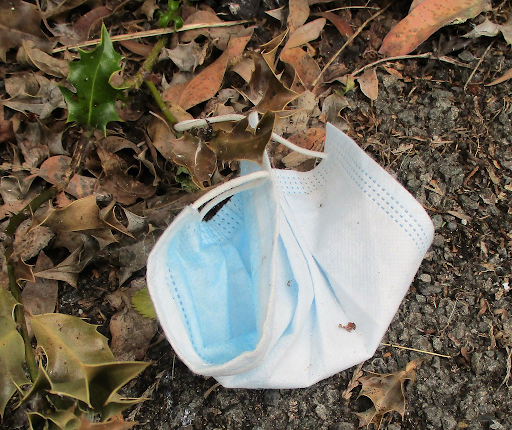Positive or Negative? Impact of COVID-19 on the environment

“Spotted on my daily lock-down exercise walk August 2020” by Diego Sideburns is licensed under CC BY-NC-ND 2.0
Face masks can oftentimes be seen littered on the ground and trampled underfoot. The simple acts of throwing it away or reusing it could help keep the trash off the streets.
October 16, 2020
From sports and travelling, to school and recreation, there is no doubt that COVID-19 plays a significant part in dictating our daily lives.
It has been eight months since the COVID-19 pandemic began. It has since changed our society and economy in ways that will probably still be affecting our world for years to come. In this distressing time, businesses are closing, jobs are being lost, and families cannot be together out of fear of infecting loved ones.
The virus and the measures taken to prevent and treat it have also played a significant role in not just socio-economic relations, but in the health of our Earth as well as in determining how this pandemic will affect the environment in the future.
Through the actions of quarantining, social distancing, and limiting travel, our Earth has had a small window to recover from decades of pollution. Modes of transportation such as airplanes and vehicles are largely credited for most of the transportation air pollution; but with jobs closed and people too frightened to fly, carbon dioxide emissions have decreased.
Because of the slight decrease of greenhouse gas emissions into the atmosphere, places like Italy and China have seen some spectacular changes. According to Greenmatters, Italy’s famous water canal waters have cleared in Venice, while record-low nitrogen dioxide levels have resulted in bluer skies and cleaner air for people living in China.
Even though the outlook is currently positive, unfortunately the long term effects of the pandemic could be worse than where we were before COVID-19.
Earlier this year, frenzied people were scrambling to obtain food and toiletries from anywhere they could buy them. They made use of what they had and what they could get, which will hopefully carry into the future with a “waste not, want not” mentality.
While people searched for packaged and preserved goods, restaurants closed around the globe; and heaps of unused, discarded food ended up going to waste since there was no one to cook them and no one to eat them.
Wasted food is a problem in itself, but when you consider the sheer amount of plastic used to protect bodies and faces around the globe; that is of even greater concern.
Plastic is prevalent everywhere nowadays, covering our bodies; our food and our packages. Plastic protective devices for those working in healthcare are discarded after one use for protection. Face masks can be seen littered and trampled everywhere. Plastic and styrofoam take out container after take out container fill trash cans to the brim. Even plastic utensils are wrapped in plastic.
“Overall I think that plastic is one of the main materials that makes up our litter,” said Winston-Salem Director of Sustainability, Helen Peplowski. “This is actually the first year in over 30 years that cigarette butts were not the number one litter item found in the litter cleanup. This year it was plastic wraps.”
Also, many people prefer to stay safe indoors and have what they need shipped to them. Most of the time, the products they ordered come wrapped in layers of plastic, bubble wrap and paper, which is way more than probably needed, and rather wasteful as well.
This is not to mention what will happen when countries reopen their borders to international travel. Hundreds of thousands of travelers will flood into countries all around the world trying to make up the vacations and reunions they were forced to cancel during the pandemic.
The increase in travelling by car, plane, bus or any other mode of oil powered transport will begin polluting the atmosphere anew, and could actually be worse than normal for a couple years after the COVID-19 pandemic has calmed down. With people in a hurry to get back to their normal lives, cars, trains and planes will be working overtime burning fossil fuels which will result in worsened air quality, warmer temperatures, and severe weather.
This however, is just a prediction. There is a chance that people will learn from this pandemic, and that going “back to normal,” will actually be a different normal. A normal where people will be more careful about the activities they participate in and how environmentally efficient they can be. A normal where people can embrace the changes that were mandatory during the pandemic and integrate those into their daily lives.

